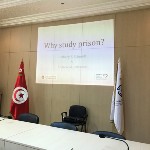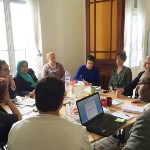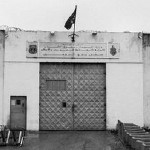Investigators: |
 |
|
|---|---|---|
|
Dr Andrew Jefferson (Senior Researcher, DIGNITY) |
 |
The Research
From 2015, Bethany and Andrew have carried out intensive fieldwork in four Tunisian prisons, alongside interviews with other criminal justice stakeholders, former prisoners, activists, academics, and civil society organisations. This exploratory research has focused on:
(i) building a positive working relationship with the Tunisian prison service (DGPR) and
(ii) developing ways to conceptualise and assess the social, moral, and political climates within prisons in post-revolution Tunisia.
We have secured access to the country’s 27 prisons, which is unprecedented. To our knowledge, this is the first ethnographic study of prisons in North Africa. This work has been generously supported and funded by the Danish Institute Against Torture (DIGNITY) and the Danish-Arab Partnership Programme (DAPP).
The research has explored several aspects of prison life in Tunisia: e.g., prison policy and the practice of punishment pre- and post-revolution; the gendered experience; the role of civil society and human rights in reform; staff-prisoner relationships; terrorism; and, how power and authority are wielded in this transitioning context. We are interested in what happens to prisons – and the experience of imprisonment – during times of transition:
- What effects do political and social reform processes have on criminal justice systems?
- How is prison life experienced by those who live and work there?
- How does democratisation impact prison practice and penal policy?
These are some of the questions that have inspired us as we continue to explore prison life here. Based on our fieldwork, we have adapted and translated the Measuring the Quality of Prison Life survey for staff (SQL), which will be piloted soon. The prisoner (MQPL) survey will be adapted in due time. This work is ongoing.
 |
 |
 |
 |
 |
Related Publications
Schmidt, B.E. and Jefferson, A.M. (2021) ‘Sensing Transition: Exploring Prison Life in Post-Revolution Tunisia’, in K. Herrity, B.E. Schmidt and J. Warr (eds) Sensory Penalties: Exploring the Senses in Spaces of Punishment and Social Control. Bingley, West Yorkshire: Emerald Publishing.
Since the revolution in 2011, Tunisia has been transitioning from decades of authoritarian rule to become the region’s only nascent democracy. Alongside the nation’s political, cultural, and social transformation has been a reform effort within the criminal justice system. A history of repressive use and persistent overpopulation has meant prisons in Tunisia have long been a cause for concern among human rights groups. The impact of overcrowding is most keenly felt in dormitory cells, which are, generally, inert environments where bodies and time move slowly, air is thick and stagnant, and movements are restricted. In sharp contrast is a post-revolution prison reform agenda that promotes the arts, creativity, (bodily) expression, and cultural engagement. In this chapter, the authors reflect upon their ethnographic encounters in Tunisia and contemplate the contradictory tendency of prisons to be over- and under-stimulating, sensorially vibrant and sensorially oppressive. The aim is to empirically explore the significance of the senses when they are considered in terms of their removal, degradation, intensification, or weaponisation. By examining the ways in which sensory accounts of the prisoner, prison officer, and the researcher mediate experiences of prison harm, power, and punishment, we illustrate the utility of an emplaced and embodied approach that is deliberately attuned to sensoriality.
Jefferson, A.M. and Schmidt, B.E. (2019) ‘Concealment and revelation as bureaucratic and ethnographic practice: Lessons from Tunisian prisons’, Critique of Anthropology 39(2): 155-171.
Drawing on preparatory work for a study of prison life in Tunisia, this article explores the twin practices of concealing and revealing that are common features of bureaucratic and ethnographic practice. Insights from the anthropology of bureaucracy and secrecy are brought into conversation with the experience of prison ethnographers (seasoned and novice) to illuminate the way prisons as peculiar sites of rule-based domination call for a particular hyper-reflexive methodological approach best understood as ‘craft’. The encounter between research team and prison bureaucracy is documented, and its multi-layered quality illustrated with descriptions of interactions in three prisons and at prison headquarters. This hesitant, slowly unfolding, constrained and contingent negotiation of boundaries is characterised as a gradual sharing of secrets where the configuration of our relationship with gatekeepers – with whom we shared and who shared with us – is highly instructive about prison life, bureaucratic practice and ethnography. The article demonstrates the fundamental role of practices of concealment and revelation in human and institutional interaction.
